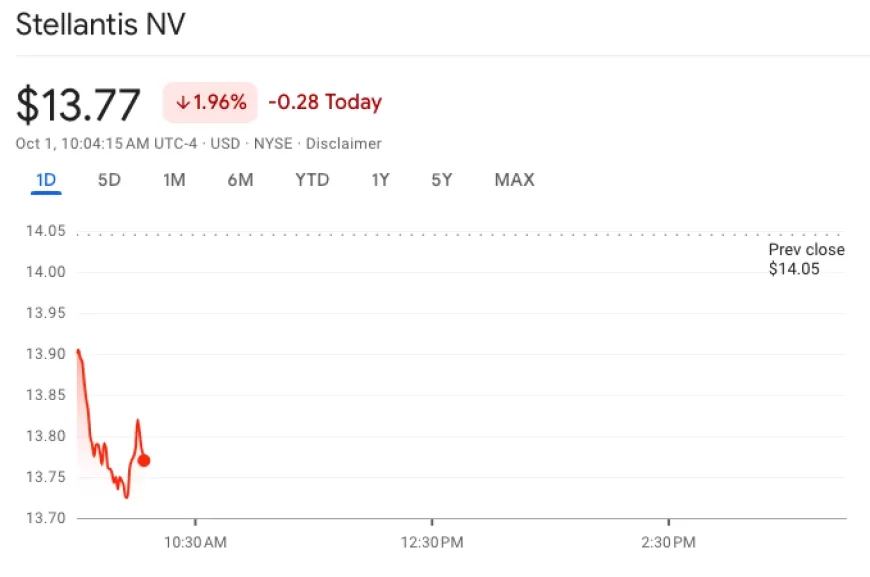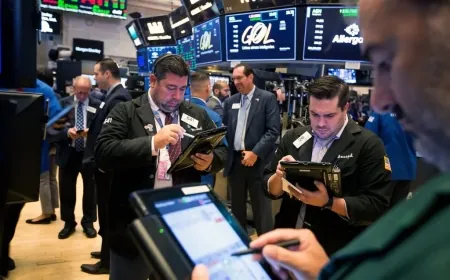US Stock Market Live: Stocks Edge Lower as Investors Eye Key Jobs and Manufacturing Data
Follow our liveblog for the latest updates on the US stock market as stocks open lower, influenced by jobs and manufacturing data. Get insights into market trends and economic indicators!

The U.S. stock market opened on a cautious note Tuesday as Wall Street kicked off the new quarter, with investors on edge and looking for fresh data to guide their next moves. Key reports on jobs and manufacturing activity are expected to shed light on the future path of interest rates and the overall health of the economy, leaving traders and analysts waiting for clarity.
The Dow Jones Industrial Average slipped about 0.4% at the start, while the S&P 500 and Nasdaq Composite each dipped by around 0.3%. This came after a strong performance on Monday, where the Dow and S&P 500 both hit record highs, only to be followed by Tuesday's more subdued mood. The Nasdaq’s slight dip shows how tech stocks, usually a market driver, are also taking a pause as investors wait for more signals.
Also Read: US Oil Giants Paid Over $42 Billion to Foreign Governments in 2023
Federal Reserve Chair Jerome Powell’s recent remarks have certainly added to the market's uncertainty. Powell made it clear that the Fed isn’t rushing to cut interest rates, even though they’re trying to keep the economy steady. This announcement made traders more cautious, as many had been hopeful for another 0.5% rate cut. With this, investors are now turning their attention to upcoming economic data to get a better read on how the central bank might act next.
One major piece of information everyone is watching is the August job openings report, set to be released later today. If the numbers come in softer than expected, it could indicate that the job market is cooling off, which might influence the Federal Reserve to take a more relaxed approach with interest rates. The labor market has been a key focus lately because it's a significant factor in how the Fed makes its decisions.
In addition, reports from the Institute for Supply Management (ISM) and S&P Global on manufacturing activity are expected later today. These reports will provide insight into how manufacturing, a crucial part of the economy, is holding up amidst rising costs and supply chain challenges. The strength or weakness of the manufacturing sector can signal the broader health of the economy, so these updates are always closely monitored by market participants.
The biggest highlight, however, is the September jobs report scheduled for release on Friday. This report will be a critical indicator of how the job market is performing and whether the economy is indeed slowing down at a manageable pace or if there are bigger issues at play. A steady but slower job growth rate would indicate that inflationary pressures might be easing, giving the Fed more room to make balanced decisions without causing too much disruption.
Adding to the market’s worries, a major strike by dockworkers on the East and Gulf coasts has begun, threatening to disrupt the flow of goods and impacting nearly half of the country’s ocean shipping. If this strike continues, it could have a ripple effect on the entire economy, potentially leading to higher costs for consumers and creating delays in getting products to store shelves. The longer the disruption lasts, the greater the risk to inflation and job security, which might stir up concerns for businesses and workers alike.
Also Read: Nike Faces Tough Times with New CEO at the Helm
Geopolitical tensions are another element adding to investor anxiety. Recent reports of Israeli troops moving into Lebanon have raised concerns over potential conflicts in the Middle East, which can have far-reaching effects on global markets, especially in areas like oil prices and international trade.
Given all these factors, investors are taking a cautious approach as they wait to see how the week unfolds. The market is trying to find its footing amid a mix of economic data, geopolitical events, and policy signals, making it more important than ever to stay informed and adaptable. As the numbers roll in, they’ll provide a clearer picture of where the U.S. economy stands and how the Federal Reserve might respond in the coming months.
In these uncertain times, it’s crucial for both seasoned traders and everyday investors to stay updated with the latest news and be ready to adjust their strategies as needed. The next few days will be pivotal in shaping the direction of the markets, making this a week to watch closely for anyone with an eye on the stock market.
Follow the latest stock market live updates here...
Key Moments
- U.S. stocks opened lower amid data anticipation.
- Powell's cautious comments impact rate cut expectations.
- August job openings and manufacturing reports could sway markets.
- Middle East tensions raise investor caution.
-
Barclays Analyst Raises Concerns Over Apple’s iPhone 16 Demand
Barclays analyst Tim Long has taken a critical stance on Apple (AAPL), highlighting a concerning decline in demand for the iPhone 16.
Long noted, “Despite earlier reports in July about increased iPhone production following the launch of Apple Intelligence, our recent supply chain checks indicate that Apple may have reduced its order by approximately 3 million units of a crucial semiconductor component for the upcoming December quarter. If confirmed, this would mark the earliest production cut in Apple's recent history.
“Our sell-through checks reveal a staggering 15% decline year-over-year in global iPhone 16 sales during the first week of availability. Furthermore, our analysis of iPhone stock levels across various regions suggests a weaker demand for the iPhone 16 compared to last year. We observed significantly shorter wait times for the device in major markets, in contrast to last year's supply chain challenges that extended lead times for iPhone 15 Pro models.
“Collectively, these insights indicate that demand for the iPhone 16 may fall short of previous expectations, particularly in key markets like the U.S. and China.”
-
Stellantis Faces Stock Drop Following Jeep Recall Over Fire Hazards
Stellantis the company behind the popular Jeep brand, experienced a 1% dip in its stock during pre-market trading on Tuesday after announcing a recall of over 150,000 hybrid Jeep SUVs due to concerns over a potential fire risk.
This downturn comes just a day after the automaker's shares plunged by 12.5% following a bleak forecast for its North American operations. Stellantis, which also produces Dodge and Ram vehicles, has revised its profit margin expectations for the year down to between 5.5% and 7%, significantly lower than the double-digit growth it had previously projected. In light of the challenging conditions facing the global auto market, the company is implementing cost-cutting strategies and rolling out discounts to help maintain its competitive edge.
The recall specifically targets the 2020-2024 Jeep Wrangler 4xe and the 2022-2024 Jeep Cherokee 4xe models. Stellantis conducted an internal investigation that linked the fire risk to 13 incidents; however, the company estimates that only about 5% of the recalled SUVs may actually experience this issue. As Stellantis navigates these challenges, both safety concerns and economic pressures are weighing heavily on its performance in the market.

-
U.S. Stocks Start October with a Subdued Performance
U.S. stocks kicked off October and the fourth quarter with a subdued performance on Tuesday. The Dow Jones Industrial Average (^DJI) dipped around 0.4%, while the S&P 500 (^GSPC) fell by about 0.3%. Both major indexes had reached record highs just a day prior, showcasing the contrasting sentiment as the new month begins.
The tech-heavy Nasdaq Composite (^IXIC) also moved downward, experiencing a decline of approximately 0.3%. Investors are now closely monitoring market trends and economic indicators to navigate the uncertainties that lie ahead. As traders reassess their positions, cautious sentiment is evident across the board, reflecting a careful approach in response to ongoing economic developments.
-
Job Openings Increase in August as Quits Rate Hits Lowest Since 2020
Job openings in the U.S. saw an increase in August, suggesting that the labor market, while cooling, is not experiencing a rapid slowdown. According to the latest data from the Bureau of Labor Statistics, there were approximately 8.04 million job vacancies at the end of August, up from 7.71 million in July. This figure surpassed economists’ expectations, who had predicted a slight rise to about 7.67 million.
The previous month's job openings were also revised upward from the initially reported 7.67 million, indicating a more robust job market than previously thought.
Additionally, the Job Openings and Labor Turnover Survey (JOLTS) reported that there were 5.31 million hires made in August, a slight decrease from the 5.41 million recorded in July. The hiring rate for August stood at 3.3%, down from 3.4% the previous month.
Another notable point from Wednesday's report was the decline in the quits rate, which fell to 1.9%. This figure marks the lowest level since June 2020 and is often seen as a sign of workers' confidence in the job market. A declining quits rate can indicate that employees are less willing to leave their jobs, which might suggest caution amid economic uncertainties.
As the labor market continues to evolve, these indicators offer a glimpse into the complexities of employment trends and economic conditions.
-
Oil Prices Climb as Iran Tensions Escalate
Oil prices rose sharply on Tuesday after reports emerged that Iran may be preparing to launch a missile strike against Israel. West Texas Intermediate (WTI) crude jumped about 3%, pushing it above $70 per barrel. Meanwhile, the international benchmark, Brent crude, also increased around 2%, hovering just under $74 per barrel.
A senior U.S. official indicated that “we have indications that Iran is on the verge of launching a ballistic missile attack against Israel.” In response, the United States is stepping up its support for Israel’s defense preparations, emphasizing that any direct military action from Iran would have serious repercussions.
The situation in the Middle East has become increasingly tense following Israel's recent ground operations in southern Lebanon, aimed at the Iran-backed militant group Hezbollah. These developments have created a climate of uncertainty that is weighing heavily on investor sentiment.
The backdrop of these geopolitical concerns, combined with mixed economic and job data released earlier in the day, contributed to a downturn in the stock market, with the tech-heavy Nasdaq composite leading the decline. Investors are now closely monitoring the situation, as further escalation could significantly impact oil prices and broader market trends.
-
Port Strike Raises Concerns, But Inflation Effects May Be Minimal
A strike by dockworkers that started on the East and Gulf coasts early Tuesday is causing significant concern, as it could disrupt nearly half of the United States' ocean shipping. This strike has the potential to cost the economy billions of dollars each day.
Ryan Petersen, the founder and CEO of Flexport, shared his thoughts before the strike commenced, stating, “If this strike continues for more than a few days or a week, we could see serious consequences.” He explained that up to 15% of the world’s container ships might be taken out of service, leading to a sharp decline in shipping capacity. Petersen warned that the disruption could be even more severe than what the U.S. experienced during the pandemic.
Despite the potential for significant disruption, Raymond James Chief Economist Eugenio Aleman believes the strike is unlikely to cause inflation to rise, which is a primary concern as the strike progresses. Aleman noted that while the strike impacts about 40% of U.S. container volumes and occurs at a critical time before the holiday shopping season and upcoming elections, it’s not expected to drive inflation like previous port shutdowns did in 2021 and 2022.
His reasoning revolves around “softening consumer demand.” Aleman pointed out that factors like slower job growth, a more selective consumer market, and expected decreases in housing costs should help keep inflation in check despite the strike.
As the situation evolves, economists and analysts will be keeping a close eye on the strike's duration and its broader economic implications, especially with the busy holiday shopping season approaching.




































































